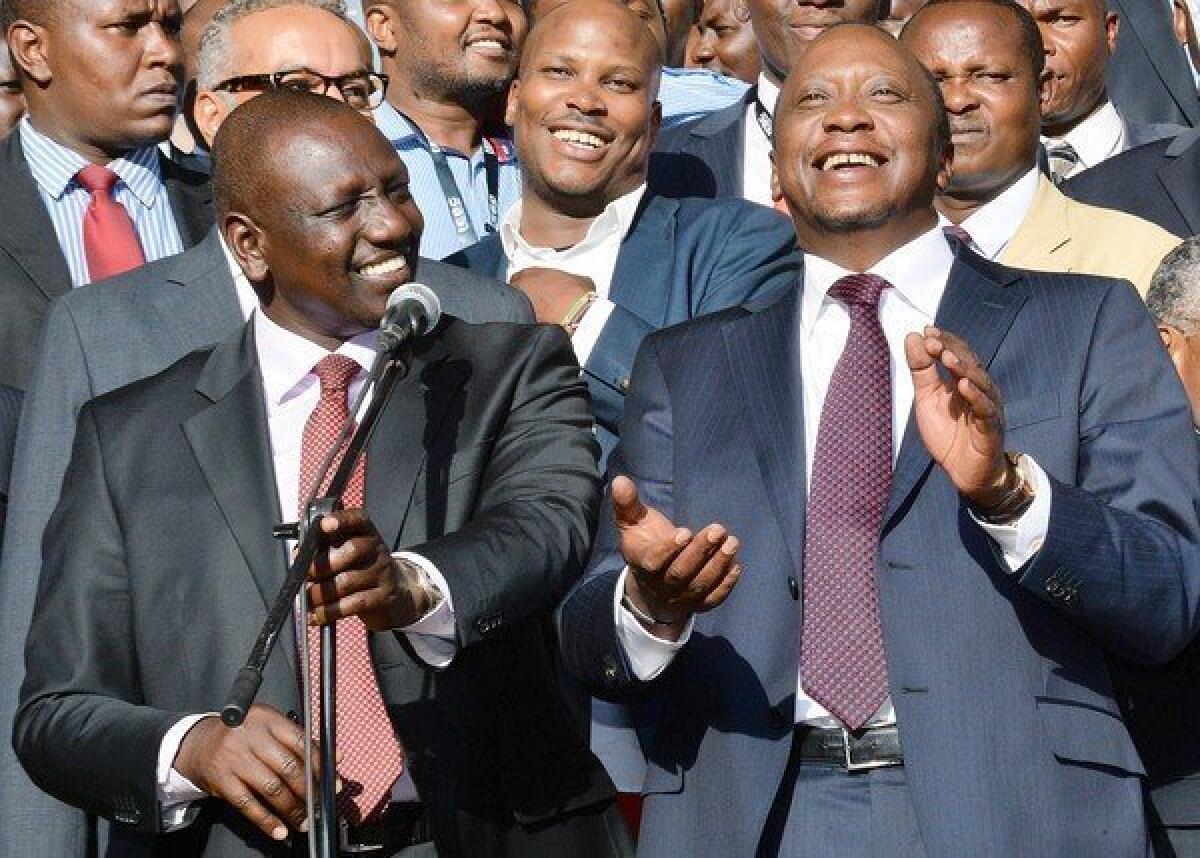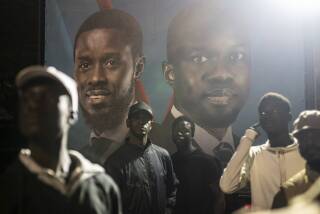Odinga vows to fight Kenya election results

NAIROBI, Kenya — After a hard-fought presidential campaign, this strategic East African country is trying to avoid a recurrence of tribal violence that killed more than 1,000 people after its last election, violence its new president-elect stands accused of helping to incite.
Kenya’s independent election commission Saturday pronounced Uhuru Kenyatta the winner with 50.07% of the vote. His main challenger, Prime Minister Raila Odinga, refused to concede, citing what he called widespread fraud and irregularities.
Western governments commended Kenyans on holding peaceful elections but pointedly avoided congratulating the declared victor. The United States, which cooperates closely with Kenya on a number of issues, including fighting Islamic militants in neighboring Somalia, had warned of consequences if Kenyatta won.
With the country desperate to avoid the violence that erupted after the last election, in December 2007, Odinga called for calm, vowing to challenge the result in court.
“Any violence now could destroy this nation forever,” Odinga said. “That would not be in anyone’s interest. Let us treat each other as brothers and sisters.”
Members of Odinga’s Luo tribe say they have been shut out of power for decades. Odinga’s supporters in the Nairobi slums of Kibera and Mathare said they were awaiting a signal from the prime minister’s Orange Democratic Movement to take to the streets, but he urged them to avoid violence.
The atmosphere in Mathare was tense. Police special forces patrolled in trucks and on foot in areas that erupted in violence after the 2007 election. Residents said Luo youths began marching at midday but were dispersed.
Kenyatta, the deputy prime minister and son of the country’s first post-independence president, is under indictment by the International Criminal Court in The Hague. He is accused of inciting followers to commit acts of violence after the last election.
His trial is scheduled to begin in July, and he has indicated he will attend it.
“We recognize and accept our international obligations, and we will continue to cooperate with all nations and international institutions in line with those obligations,” he said at a news conference. “However, we also expect that the international community will respect our sovereignty and the democratic will of the people of Kenya.”
Odinga also disputed the 2007 result, and he became prime minister under a 2008 deal on a national unity government.
On Saturday, he said there were “massive discrepancies” in the vote counting and complained that the Independent Election and Boundaries Commission wouldn’t allow a recount despite the small margin by which Kenyatta crossed the 50% threshold to avoid a runoff: about 8,000 votes out of 12.33 million cast. The turnout was 86%, the highest in the nation’s history.
“Nothing would have pleased me more if I’d lost fairly. But I have a duty and responsibility to protect democracy in this country,” he said. “The struggle for democracy has been very long, and we are not going to surrender it to the forces of darkness.”
The election commission’s chief, Issack Hassan, rejected claims that the results had been tampered with. International observers have described the vote and count as transparent, Reuters reported.
Kenyatta’s supporters took to the streets with plastic trumpets and drums to celebrate, while Odinga’s supporters were so upset that some said they couldn’t eat, and others vowed to swear off voting.
“From what we see, the election wasn’t genuine. There was rigging,” said Martin Wakube, 27, an unemployed father of two who lives in the Kibera slum. “I don’t even have an appetite to eat right now, because of this election.”
“We don’t feel good,” said Cynthia Merab, 25. “We voted for [Odinga] in 2007 and the same thing happened. If [Odinga] had won, many tribes would have been happy, but now only two tribes are celebrating,” she said, referring to the Kikuyu and Kalenjin tribes represented by Kenyatta and his running mate, William Ruto, who also faces ICC charges of crimes against humanity.
“We feel a lot of pain,” Merab said. “I don’t think I’ll ever vote again.”
Luo tribe members were particularly riled by scenes of Kikuyus celebrating that aired on television before the official announcement that Kenyatta had won.
“They [Kenyatta supporters] were saying that Odinga should go be a [local government] councilor and we Luos should go fishing. It hurts us a lot. Even if they’re celebrating, they should celebrate maturely,” Merab said.
Kenyatta’s supporters said the result showed that Kenyan democracy had come of age.
Martin Kinuthia, 18, a Kenyatta supporter in Mathare, said Odinga’s court challenge was likely to create more tribal tension.
“If he challenges the result, there will be difficulties. Maybe a war will come, because right now the results are all over and everyone knows that [Kenyatta] has won. There’s a lot of tension,” Kinuthia said.
He said the international charges against Kenyatta were embarrassing for Kenya, “but maybe someone said he did it and maybe he didn’t. Maybe someone set him up.”
Despite the strong voter turnout, Kenyans failed to elect any women as senators or governors, and the population voted largely along tribal lines.
The result left power in the hands of the elite in central Kenya and the Rift Valley that has ruled since the country won independence in the early 1960s. It doles out patronage to tribal allies.
Kenyatta was nominated to the parliament in 2001 by former President Daniel Arap Moi and later joined Moi’s Cabinet as minister for local government.
More to Read
Start your day right
Sign up for Essential California for news, features and recommendations from the L.A. Times and beyond in your inbox six days a week.
You may occasionally receive promotional content from the Los Angeles Times.






